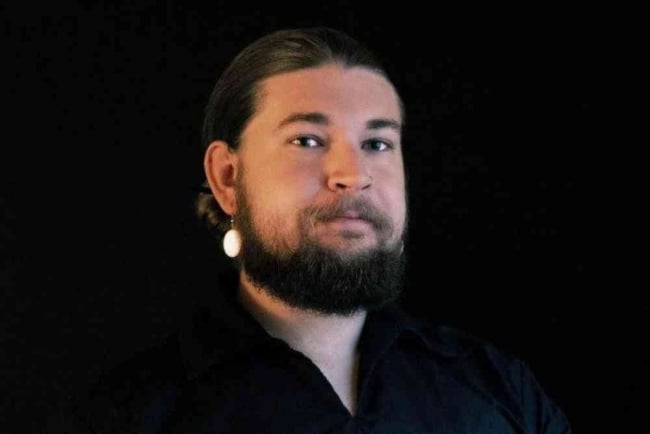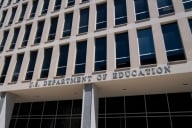You have /5 articles left.
Sign up for a free account or log in.

Jared Nally
Jared Nally, editor in chief of The Indian Leader, the nation’s oldest Native American student newspaper, said he began to notice a “media blockade” over the summer by administrators at Haskell Indian Nations University, a tribal college in Kansas.
Nally said ever since the university’s new president, Ronald Graham, assumed his position in May, it has become more difficult to report and write articles about important events and issues the newspaper would normally cover, including how students were being counted for the 2020 Census and how a semester fee would be allocated as remote instruction resumed in the fall. When a university staff member died in October, Nally emailed a spokesman for the Lawrence Police Department to gather more information about her death.
The following week, Nally received a “directive” from Graham, stating that Nally had “attacked” college officials and exhibited “disrespectful behavior.” Graham harshly criticized Nally’s attempts to learn more about the staff member’s death and threatened him with disciplinary action under the university’s student code of conduct.
“Under no circumstances do you have the authority to contact the police department (or any other governmental agency) and demand anything on behalf of the university,” Graham’s Oct. 16 directive said. “Your behavior has discredited you and this university. You have compromised your credibility within the community and, more importantly, you have brought yourself, The Indian Leader, Haskell, and me unwarranted attention.”
The directive was widely denounced by professional journalism associations and free speech groups that advocate for students’ First Amendment rights, who said Graham's actions were an obvious form of suppression. The Native American Journalists Association, or NAJA, published a statement that said Graham’s directive “disrespects protected free speech and press freedom.”
“Graham’s attempt to threaten and intimidate an Indigenous student represents not only Graham’s failure to meet the moment as an educator and administrator, but a failure of the institution to ensure an environment that cultivates and encourages Indigenous youth who seek to serve their community with responsibility, compassion, and commitment,” the statement said.
Steve Prue, a spokesman for the Office of the President, declined a request for comment.
Though Nally, a junior and member of the Miami Tribe of Oklahoma, said he is still learning the ins and outs of journalism, he considered sending government officials a “respectful” email inquiry a routine matter. He identified himself as a writer for the Leader in his email to the police spokesman.
Nally found it upsetting that Graham used the staff member’s death “to justify silencing the press.” The criticisms made Nally question himself as a student journalist.
“It made me feel like a negative version of myself was being painted, and I don’t think it’s accurate at all,” Nally said.
The day after he received Graham's directive, Nally sent a complaint to Tony Dearman, director of the Bureau of Indian Education, or BIE, the federal agency that oversees the university. Nally asked Dearman to review the directive, which he described in the complaint "as a threat and intimidation with the intent to withdraw my student rights."
When the complaint was passed on to another official at the BIE, Nally reached out to the advocacy groups for additional help.
Francine Compton, the president of NAJA, and representatives of the Foundation for Individual Rights in Education, or FIRE, and the Student Press Law Center, who are advocating on behalf of Nally and the Leader, sent a letter to Graham on Oct. 26 urging him to rescind the directive. The letter noted other examples of how Haskell administrators have allegedly retaliated against the Leader, including removing its longtime faculty adviser and withholding university funding for the newspaper this semester.
“Your ‘directive’ to Nally is an appalling and unequivocal departure from the First Amendment, betraying willful blindness to the basic concepts of constitutional rights,” the letter said. “A public college administrator who violates clearly established law will not retain qualified immunity and can be held personally responsible for monetary damages for violating First Amendment rights.”
Brandon Stevens, president of the Haskell Board of Regents, declined to go into detail about the directive, citing the university’s status as a federally owned and operated institution. Stevens said that the situation was "outside of our scope as the Board of Regents," that the board had not yet discussed it, and any investigation into the matter must go through a “convoluted” and “bureaucratic” process, he said. Stevens did express the board’s support for student journalists, however.
“In general, the Board of Regents supports freedom of the press and integrity of journalistic standards,” he said. “That’s as general as I can really be without going into too many details of it.”
Lindsie Rank, a program officer at FIRE who handles student press suppression complaints, said Graham’s directive is particularly “strange” because his threats were about Nally’s reporting practices, not specific articles critical of the Haskell administration, which is a common basis on which college leaders punish or try to silence student journalists.
Haskell is a public tribal college funded by the federal government and overseen by the United States Department of Interior and Bureau of Indian Education, and “free expression should be at the forefront of its institutional values,” Rank said. FIRE also submitted a complaint on Oct. 27 on behalf of Nally to the Office of the Inspector General of the Department of the Interior.
Haskell, unlike other colleges, is also bound by a 1989 settlement agreement with the Leader, in which the university agreed that its employees will not “restrain, obstruct or prohibit the publication of The Indian Leader newspaper or otherwise inhibit the free expression” of its members in any way that violates the First Amendment.
The settlement stemmed from a lawsuit filed in Kansas district court by members of the Leader about 30 years ago, which claimed that the then president, Gerald Gipp, had administrators change a failing grade received by his daughter to a passing grade, according to The New York Times. Gipp's daughter was also employed by the admissions office and received a $600 bonus while working there, the Times reported. The Leader published a story about the controversy and allegedly faced suppression as a result, the Times article said.
Rank said the settlement “applies directly” to Nally and the student newspaper’s current staff members “because the directive appears to be a cut-and-dry attempt to suppress the journalistic activities of The Indian Leader editorial leader.”
While a private or religious college may be able to justify taking disciplinary action against students for expression that goes against institutional values, such as “respect” and “honesty,” which are mentioned in Graham’s letter, Haskell has no such basis for threatening Nally due to its public status, Rank said. The most recent available version of the university’s student code of conduct from 2016 states that “expression of all views is permitted, consistent with” Haskell’s values of communication, integrity, respect, collaboration, leadership and excellence, or CIRCLE. Rank said this wording is “problematic.”
“The values of a state- or federally funded university cannot come into play when we talk about free expression rights,” Rank said. “Free expression rights at a public institution are defined very clearly by case law at a public institution … This university’s values are in the Constitution.”
Graham’s directive also criticized “attacks” by Nally on Haskell staff members in instances where Nally was acting independently of his position at the Leader. Over the last four months, Nally has lodged public complaints about university administrators’ actions and sought information as a student at the university.
In one instance, Nally went to the Community Police Review Board, a public body in the City of Lawrence that advises the police department on issues of racial bias in policing, to complain about Tonia Salvini, vice president of student services, who is a member of the board. Nally claimed Salvini, who oversees campus housing, reported all students’ information to the United States Census Bureau for the 2020 count without asking them to self-identify their race or gender, which prevented biracial students from being counted as the racial identity of their choice.
Students who attend Haskell are all members of federally recognized Native American tribes in the U.S., but some, including Nally, are not solely Indigenous people and want to be counted accurately, he said. Nally identifies as both Native American and Russian German.
Salvini declined to comment in an email.
Graham also criticized how Nally obtained information from a financial aid official about the fall 2020 semester fee, which has been an ongoing point of contention between Haskell administrators and students.
The Haskell Indian Nations University Student Government Association, like the Leader, attempted multiple times to get more information from the university about how a $715 fall semester fee would be allocated. The student government association posted to its Facebook page on July 29 that “no answers to our questions” were provided.
“We deserve to know what is being decided on when it comes to matters regarding the student body,” the student government post said. “With no public statement for weeks, we are becoming even more ambivalent, frustrated, and annoyed that the Haskell administration continues to ignore our emails.”
Nally, similarly frustrated with the lack of information provided to the Leader about the fee, recorded a telephone conversation he had with a university financial aid official about the fee and included details about their conversation and a link to the recording in a first-person opinion piece published on the Leader’s website. He did not identify himself a to the official as a reporter for the Leader, and he recorded her without her consent, which is legal under Kansas law.
Rank, from FIRE, said whether Nally’s actions were “ethical” or “moral” is a separate question from his claims of press and speech suppression. Sommer Ingram Dean, a staff attorney for the Student Press Law Center who signed FIRE’s letter to Graham, said Nally followed the law and it was a “shame” he had to hide his identity as a student journalist in order to obtain the information in the first place. While student journalists should consider whether their reporting practices can hurt their relationship with administrators, it doesn’t overshadow the misconduct by Graham, Dean said.
“In the big scheme of things, with all the First Amendment violations that have happened here and all the trouble that Jared was having even being able to fulfill his basic duties, this isn't the thing to highlight,” she said.
Compton, of NAJA, said she is concerned that the directive could deter a promising Native American student journalist -- who has won NAJA awards -- from pursuing a journalism career. She said Indigenous communities have been “underserved by mainstream media for hundreds of years” and the directive reflects a pattern of Indigenous journalists being silenced.
“This letter could have been a career-stopping moment for any student,” Compton said. “It felt reflective of other heads of organizations looking to silence Indigenous journalists … It’s upon us to show our members support. [Nally is] an award-winning journalist, and when I look at his work I don’t see student journalist, I see journalist with a capital ‘J.’”








